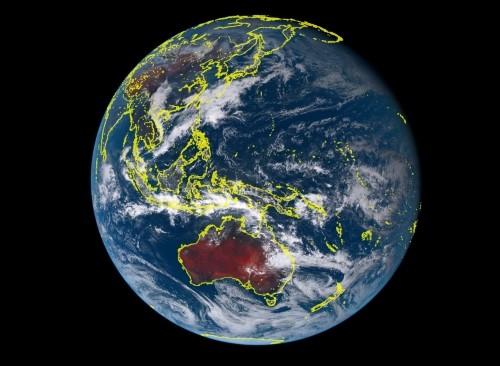
The Earth as seen by Himawari-8 earlier today. (Courtesy: JSA)
By Hamish Johnston
Who hasn’t wanted to float high above the Earth and gaze down on our planet as sunlight and clouds dapple across its surface. Thanks to the “Glittering Blue” animation, such views are not just for a privileged few astronauts. This stunning animation of one day’s observations from the Japanese weather satellite Himawari-8 has been put together by satellite-imagery analyst Charlie Lloyd. He has also included a nice FAQ page that explains some of the amazing phenomena captured by the satellite, including a huge tropical storm and the daily cloud cycles of a rainforest.
You can read more about Lloyd and the images in The Atlantic article “A New and Stunning Way to See the Whole Earth”. If you want to know what Himawari-8 is seeing right now, it has its own live webcam.
Who should appear on the £10 note printed by the Royal Bank of Scotland? Many north of the border are backing the astronomer Mary Sommerville, who was active in the early 19th century and famously predicted the existence of Neptune by its influence on the orbit of Uranus. She and Caroline Herschel were the first women to be members of the Royal Astronomical Society and she also wrote the best-selling science book On the Connexion of the Physical Sciences.
Sommerville is up against tough competition for her place on the £10 note – James Clerk Maxwell is also in the running – but according to the Scotsman columnist Lori Anderson, “Somerville is far more noteworthy than Maxwell” and I agree wholeheartedly.
Would you tune in to 30 minutes of radio devoted to the science of refrigeration? Physics World contributor Philip Ball thinks so, especially if Albert Einstein is woven into the story. You can listen to Ball’s chilling tale of killer household appliances and how the famous physicist tried to make the kitchen a safer place in “Einstein’s fridge” on BBC Radio 4.
Finally, what do you call a group of planetary scientists? An “accretion”, according to physicist Charles Clark, who has joined in the fun on Twitter, where people are suggesting collective nouns for different types of scientists: #scientistherdnames. Some of my favourites include a “flop” of computer scientists, an “enigma” of cyptographers and a “bunch” of beamline scientists. Any other suggestions for types of physicists?
Guidelines
Show/hide formatting guidelines
this text was deletedwhere people live in harmony with nature and animals</q>
Some text